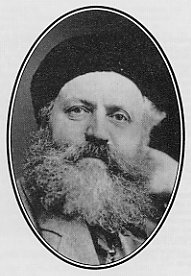|
Makers
Violin History & Timeline
PERFORMERS
Violin
Viola
Cello
Bass
Gamba, etc.
The Roots of Famous Violinists
TEACHERS
Violin
Viola
Cello
Bass
DEALERS
Listings
Specialist
Event
LUTHERIE
Bibliography
Listings
Gallery
COLLECTING
Identification
Buying
Selling
THE INSTRUMENTS
Violin
Viola
Cello
Bass
Viol
Bows
Tales
LINKS
Interesting Sites
GALLERY
Antique Instruments
Historical Photos
|
|
 Charles
Gounod was devoted to both his church, and his music. His love for
composition and performance kept him from joining the clergy, as he
looked to music as a source of spiritual inspiration. Born in Paris on
June 17, 1818, Gounod stemmed from a family of artists. His father was a
talented painter, and his mother was a pianist. As Gounodís father
died when the boy was merely five years old, Gounod was raised solely by
his mother. She encouraged his love for music, and gave him his first
piano lessons. At school, Gounod relished his music classes the most,
and at the age of thirteen decided that he wanted to devote his life to
music. His mother, a shrewd businesswoman, as well as an admirable
musician, supported Gounodís love for music but demanded that he
complete his academic studies before pursuing a musical career. Charles
Gounod was devoted to both his church, and his music. His love for
composition and performance kept him from joining the clergy, as he
looked to music as a source of spiritual inspiration. Born in Paris on
June 17, 1818, Gounod stemmed from a family of artists. His father was a
talented painter, and his mother was a pianist. As Gounodís father
died when the boy was merely five years old, Gounod was raised solely by
his mother. She encouraged his love for music, and gave him his first
piano lessons. At school, Gounod relished his music classes the most,
and at the age of thirteen decided that he wanted to devote his life to
music. His mother, a shrewd businesswoman, as well as an admirable
musician, supported Gounodís love for music but demanded that he
complete his academic studies before pursuing a musical career.
Thus, at the rather late age of eighteen, Gounod
enrolled in the Paris Conservatory. He studied under Halevy and Lesueur,
and won the acclaimed Prix de Rome. The Prix de Rome required that
Gounod spend three years in Rome. During this period Italian church
music became particularly meaningful to him, and his religious
tendencies were heightened. He attended the Sistene Chapelís services,
and began to write church music. The production of two Masses was
undertaken, one of which was performed in Rome and the
other in Vienna.
After returning home, Gounod began the intensive
study of theology, and seriously contemplated joining the clergy. At
this point he was forced to determine whether he wanted to spend his
life as a priest or a musician. Unable to relinquish his love for music,
Gounod decided to exalt God through his compositions. He continued
writing church music until the renowned prima donna, Pauline Viardot,
accidentally encountered him and requested that he write an opera for
her. Gounod could not turn down the patronage of such a noteworthy
performer, and produced an opera, Sapho, in which Viardot
starred. Although the opera was not particularly successful, it
convinced many audience members of Gounodís musical talent.
While directing a choral group, the Orpheon Society,
Gounod experimented with writing more operas. Constantly plagued by
censors and ailing performers, most of Gounodí s operas did not
receive much acclaim. However, Faust, an
opera that suffered a poor initial reception, soured to great heights
many years later. It became Londonís most popular operas in the 1870s,
and was performed thousands of times in Paris.
Working as a choral director, Gounod retained his
love for church music. He eventually gave up the writing of operas, and
devoted himself entirely to religious pieces. He produced several
masses, and passed away in 1893 during the writing of a Requiem. Gounodís
melodious works, filled with tender sweetness and refinement, are best
exemplified by his breathtaking piece, Ave
Maria. This work is truly a jewel that captures the essence
of Gounodís life work. Music seemed to define his religion, resulting
in works that resonate with purity and power.
Notes by Shanaira Udwadia (July-2001) |